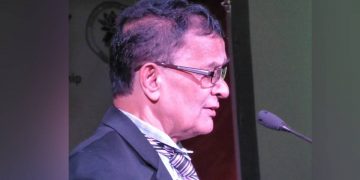Dear Editor,
Former Prime Minister of Guyana and one-time PNC strongman Mr. Hamilton Green states that ethnic diversity of workforce should apply to all sectors of the economy. Mr. Green refers to a statement made by a senior public security officer on the need to redress the imbalance in the security forces (Police, Army, Prison, and the People’s Militia). PPPC supporters have been advocating for decades now the need to ethnically balance the security forces. And they have history on their side. In 1965 the ICJ (International Commission of Jurists) recommended that the imbalance in the security forces should be gradually redressed. Since then, however, no notable change in ethnic composition of the security forces has been made for a variety of reasons. If ethnic diversity of the security forces is pursued, Mr. Green posits: “I among others argued ……that if the State apparatus believes in the utility and necessity for ethnic balance then such a philosophy must permeate and saturate all aspects of our society.” This is a classic “quid pro quo” situation.
This position of Mr. Green, though sounding tantalizing at the theoretical level, is flawed in several respects, especially when viewed at the practical level. While government has the capability to ensure that public sector employment could reflect the ethnic diversity of the society, a similar argument could not be made for private sector employment or business enterprises. But to what extent public sector ethnic diversity in workforce will compromise professionalism and qualification is another major factor for consideration. Mr. Green provides a list where Afro-Guyanese are grossly under-represented. For them, he advocates the use and allocation of state lands for forestry and mining; the grant of licenses for the importation and sale of pharmaceuticals, allied goods, and equipment; importation and sale of groceries and foodstuff; importation of motor vehicles and heavy equipment, and the award of major contracts. What’s startling is that Mr. Green’s party, PNCR was in power between 2015 to 2020 and they did not move to implement any of these projects, apart from allocating to friends and cronies’ huge tracts of lands, which critics claim would not necessarily be for economic development but rather for speculative purposes.
Notwithstanding, besides the grant of licenses for different purposes, what a government could further do in respect of private businesses (whether individual, partnership or corporate) is to encourage (not to mandate) these entities to (1) consider recruiting a diverse workforce; (2) giving incentives to companies for ethnic diversity hiring; (3) making loans and grants available to ethnic groups that want to engage in private enterprise, etc.); and (4) setting up private-public partnerships for implementation of neighborhood revitalization programs. The PNC had always believed that Afro-Guyanese have been marginalized. Since the 1970s, the PNC government had begun a process to empower economically their supporters through the establishment of Cooperatives and the attendant Coop Bank, the Agriculture Development Bank, KSI (Knowledge Sharing Institute), Nationalization, etc. The PNC government’s intention was to make Co-ops the dominant sector of the economy. By the end of the 1980s all the empowerment initiatives had failed. To arrest the rapid downturn of the economy, President Desmond Hoyte was forced to negotiate an ERP (Economic Recovery Program) with the IMF (International Monetary Fund) and the World Bank.
More recently, (2016) to revive interests and to play a leadership role in the private sector, Afro-Guyanese leaders launched the “African Business Roundtable” (ABR). This was supposed to be a major vehicle for the promotion and implementation of Afro-Guyanese businesses. Much was therefore anticipated but it is not clear what they have accomplished so far. At the launch, ABR leaders did not find it necessary to join the existing and well-established PSC (Public Sector Commission) but preferred to work separately. If Mr. Green is concerned about equity and inequality, as do a substantial number of Guyanese, he should also know that currently there is ethnic diversity in the awarding of house lots and housing allocations; in scholarship awards; and neighbourhood infrastructure works. These are vital empowerment programs.
While ethnic diversity in workforce could happen in the public sector, such diversity in the private sector, though a laudable goal, would not be easy to realize since major decisions are made there not by government or political leaders, but by business leaders, whose bottom line is maximization of profits. The philosophy of the private sector is different from that of the public sector. The private sector is profit driven, takes risks, commits to deferred gratification, is innovative, and is highly competitive. The public sector is essentially service oriented, risk free, inclined towards immediate gratification, and ritualistic towards work. However, despite the formidable challenges, one should not abandon the dream of equality of access to opportunity as well as the need for ethnic diversity in the workforce (both in the public and private sector). These goals are worth pursuing.
Sincerely,
Dr. Tara Singh





































































